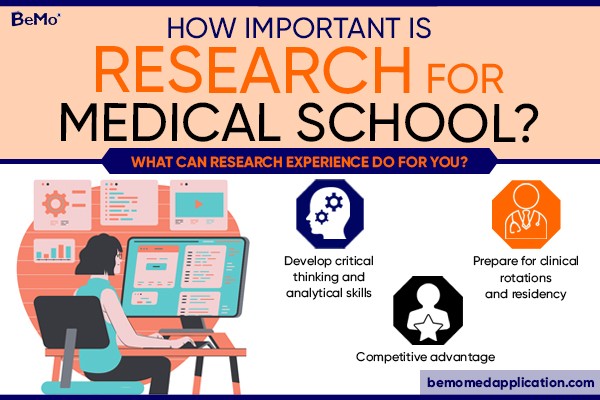You might be wondering how important research is for medical school? Research is a critical part of your medical learning, and it’s important for getting into medical school and throughout your medical career. Research experience of any type is a valuable asset on medical school applications, and research experience as a premed is becoming a de facto requirement for many medical schools. In this blog, we’ll look at how important research is for medical school, what research experience can do for you and where to look to find medical research opportunities.
>>Want us to help you get accepted? Schedule a free initial consultation here <<
Listen to the blog!
Is Research Important for Medical School?
There are two sides to this question. The first is whether research experience is important for medical school applications. The second is whether gaining research experience is an important part of attending medical school. The answer to both of these is undoubtedly yes, research is very important for medical school.
Of course, there are some qualifications to this importance. Having research experience is not a hard medical school requirement and students can still be accepted without premed research experience.
For highly competitive medical schools, such as Stanford Medical School, or medical schools with a heavy focus on research, it may not only be a requirement but a huge asset and a way for you to ensure your medical school application stands out. And if you plan to apply to an MD-PhD program, research experience is an absolute must.
For a majority of competitive, research-heavy medical colleges, up to 99% of matriculating students have prior research experience.
It’s a good idea to check Medical School Admission Requirements (MSAR) to see if your choice of med school requires you to have any research experience and what percentage of matriculants had research experience. Even if your dream school doesn’t require research, you can still consider looking for premed research opportunities to add to your application as a bonus.
First, let’s look at what research experience can do for your medical school applications.
The Value of Research Experience for Premed Students
Getting research experience as a premed student will set you up for success in your medical school applications. Having any kind of research position in a scientific discipline will lend you invaluable experience and skills that any admissions committee will look on positively.
Research experience is highly valuable when applying to medical school because it demonstrates critical thinking, problem-solving, and a commitment to advancing medical knowledge. It also shows admissions committees that you can handle the rigorous demands of medical education while actively seeking to improve patient care through evidence-based approaches.
Any research experience you gain is an asset as it builds skills and your resume. Don’t stress if your first research experience seems too basic or not rigorous enough. Often times the best research positions are hired from those who have previously worked in a lab in a less research-intensive position, so you can work your way up the ladder! That being said, there are some types of research experience that can boost your application more than others.
Something that can help you stand out even more is clinical research experience. Clinical research experience is essentially a trial run for being a doctor. If you can show in your medical school application that you have excelled in a clinical research environment, this suggests you will excel in medical school and in the medical field more broadly.
Gaining clinical research experience as a premed might not always be possible for all students. If you are unable to find clinical experience with a physician before your medical school applications are due, that is okay! There are many other options out there to gain research experience. You might find virtual research experience can allow you to gain skills and add research to your application even if you are in an area with fewer opportunities.
Remember that any type of research experience you gain can be valuable, and allow you to develop the skills coveted by medical schools. Most medical schools don’t require you to find clinical research, or even research in the medical field, to be accepted. What matters if the skills and experience you gain, not what topic you researched.
Check out our video for more advice on how to find premed research experience
How Important is Research Experience During Medical School?
Research is still an important aspect of medical school studies and being a practicing physician. Even if your choice of med school isn’t bothered by a lack of premed research experience or you don’t plan to pursue a career in medical research, this doesn’t mean you’re off the hook.
Doctors rely on research to inform them and broaden their understanding of the medical field such as finding new treatment options. Research experience also serves as a way to make your medical school resume stand out when you’re applying for residency programs and beyond. It might even be a requirement if you want to apply for research training positions or specialty medical research jobs.
So how can research experience help you in medical school? What advantages and benefits can it bring you? We’ll take a closer look at how important research is for medical school studies and how it can be a long-term advantage in your career.
As we’ve seen, having some research experience can give you a competitive edge when applying to certain med schools or programs which are highly selective or have a special emphasis on medical research and innovation. It’s also a big plus if you plan to apply for any research positions as a medical graduate or any training positions, rather than pursuing clinical practice. But having some research jobs, outside of medical school studies, can give your residency CV a boost or help you land a spot at some fellowship programs as a graduate, too. Having some research credits behind you can be a nice advantage in the physician job market. Research is beneficial prep for clinical practice once you’ve graduated from med school. It can even be helpful for those asking how to prepare for clinical rotations in med school. This is because practicing physicians may continue to conduct research, and hospitals and other job positions will even provide protected time for its doctors to conduct this research, just as med students receive dedicated research time. Conducting research and publishing research is a part of being a physician, and learning the ropes early on in med school will prepare you for life as a practicing doctor. The entirety of your medical knowledge comes from medical research and understanding, so it’s crucial for you to experience how research is done firsthand and be able to identify legitimate research and critically evaluate emerging work. In the vein of critically evaluating research work, conducting research will naturally develop your critical thinking and analysis skills. Throughout med school you will be asked to participate in, read about and conduct research, as doing so is part of the foundation of your medical knowledge. Research experience can also be influential in developing other important medical skills, too, such as better communication, teamwork and writing skills. It’s also been shown through research that doctors who continue to learn about medicine and study medical research provide better care to patients overall. If nothing else, making a habit of regular research and study will keep you fresh and up to date on the medical field and its latest developments.
Finding Research Opportunities: a How-To Guide
Whether you’re a premed, current med school student or medical graduate, gaining some research experience is important for your career. There are a number of places to look for opportunities, but the best ways are to use your network of contacts and ask them for recommendations. There are many programs, internships and study programs which offer research experience, and your school professors, mentors and advisors will have more insight into where to find them.
For students who have prior research experience, consider reaching out to your past research supervisors for their recommendations for additional experience. Research position supervisors are also a great place to look if you’re wondering how to find verifiers and referees to ask for reference letters or letters of recommendation.
If you’re still looking for experience, here are some quick and easy ways to start looking for research positions:
Your professors in medical school may know of any open research positions or may be conducting research themselves and need student interns Your clinical supervisors or mentors may be able to point you in the direction of research internships or programs you can apply for Medical school advisors or college advisors can be a great way to find research opportunities tailored to your interests and career goals. Study abroad, internships or international volunteering experience can be a way to gain research experience in a novel setting. The time commitment can vary, but it can lead to incredible experiences For students wanting to go from high school to med school, there are some excellent summer programs for high school students or medical internship opportunities.
FAQs
1. How important is research for medical school?
Research can be a big advantage on both medical school applications and on medical school resumes for graduate medical students.
2. Can I get into med school without research?
Yes; research experience is not a definite requirement at most med schools and students without experience can still be accepted with a strong application.
3. Do medical schools care about research?
A majority of medical schools don’t require research experience for med school applications, with some exceptions. However, as a matriculating med school student you will be expected to gain research experience and participate in research projects during your school years.
4. How do I find research opportunities as a pre-med?
Premed students can find valuable research positions through summer internship programs or by consulting with a college advisor. Professors and mentors are also a good option for finding research opportunities. Premeds can also look into study abroad programs that offer research experience.
5. Is research more important than clinical experience?
No; most medical schools consider direct clinical experience more important than lab or field research for admissions. However, if you plan to apply for medical research positions, to a research-intensive med school program or want to pursue an MD/PhD, then research experience will be considered more important to have.
6. What does research do for med students?
Research is part of the foundational skills med students will learn and will take with them into their future careers. Research experience can also provide a competitive advantage in the job market and prepare them for residency positions or work as a practicing physician.
7. What if I’m not interested in a research position after med school?
Even if this is the case, research is a large part of being a physician and you will be required to gain at least a little experience with medical research throughout your med school career.
8. Does the type of research matter for medical students?
Generally speaking, no. Medical schools aren’t picky about the type of research experience you have, or even if the subject of the research undertaken was non-medical. Any research experience is valid.

